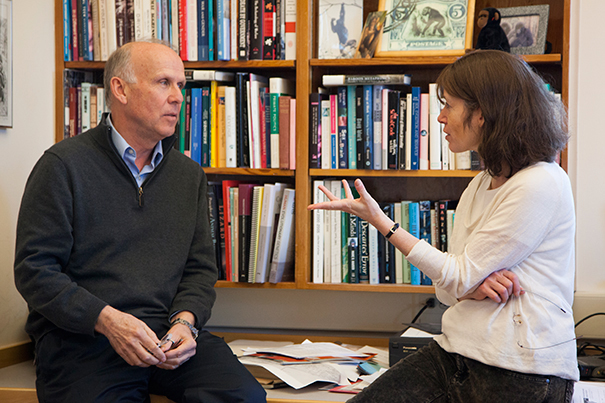
It’s not exactly front-page news that when it comes to conflict, men and women usually behave very differently. The way they resolve those conflicts also tends to differ.
While men can be aggressive and combative, a new study shows that, from the tennis court to the boxing ring —modern equivalents of one-on-one conflict — men are more likely than women to make peace with their competitors after the competition ends.

Professors Joyce Benenson and Richard Wrangham have released a study that examines the way men and women cooperate.
Using videos of four sports in 44 countries, Joyce Benenson, an associate of Harvard’s Human Evolutionary Biology Department and a professor of psychology at Emmanuel College, and Richard Wrangham, the Ruth B. Moore Professor of Human Evolutionary Biology, found that men are far more likely to engage in friendly physical contact — handshakes, back pats and even hugs — following competition than women are. The study is described in the journal Current Biology.
Importantly, Benenson said, the study also lends credence to what researchers call the “male warrior hypothesis,” the notion that men broker good feelings after conflict to ensure they can call on allies to help defend the group in the future.
“This finding feels very counterintuitive because we have social science and evolutionary biology models that tell us males are much more competitive and aggressive,” Benenson said.
Though accurate, those models are incomplete, because they didn’t explain a curious behavior observed among male chimps.
“Male chimps show tremendous aggression, even to the point of killing other males, but they also often reconcile immediately following a conflict,” she said. “They do that because, in addition to the battle to sire the most offspring, they also have to cooperate to defend their community in lethal intergroup conflicts. So the question is how do you get from these severely aggressive 1:1 dominance interactions to cooperating with your former opponents so you can preserve your entire community? We think post-conflict affiliation is the mechanism.”
The quest to understand that mechanism has been a years-long search for Benenson.
The study was sparked by questions of how men prevail against outside groups — whether in war or in symbolic battles like business deals — while still continually competing with others in their own group. Earlier studies had shown male chimps were more likely than females to try to put hard feelings to rest following a head-to-head conflict, spurring Benenson and Wrangham to wonder whether the same might be true among humans.
To get at the question, they turned to a modern form of conflict: sports. Sports provide identical conflicts for males and females, so sex differences can be objectively examined.
(Published with permission from Harvard Gazette.)













